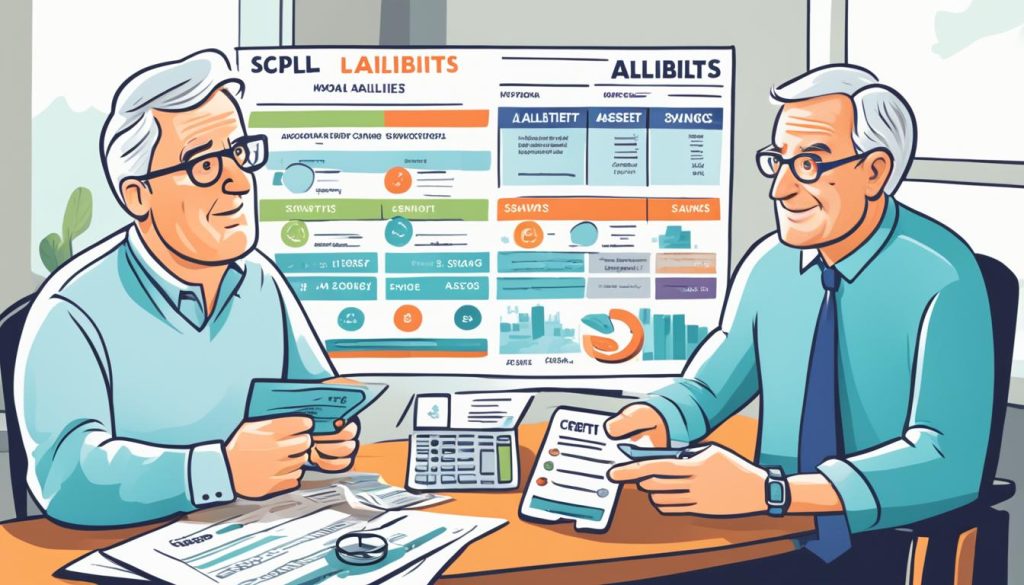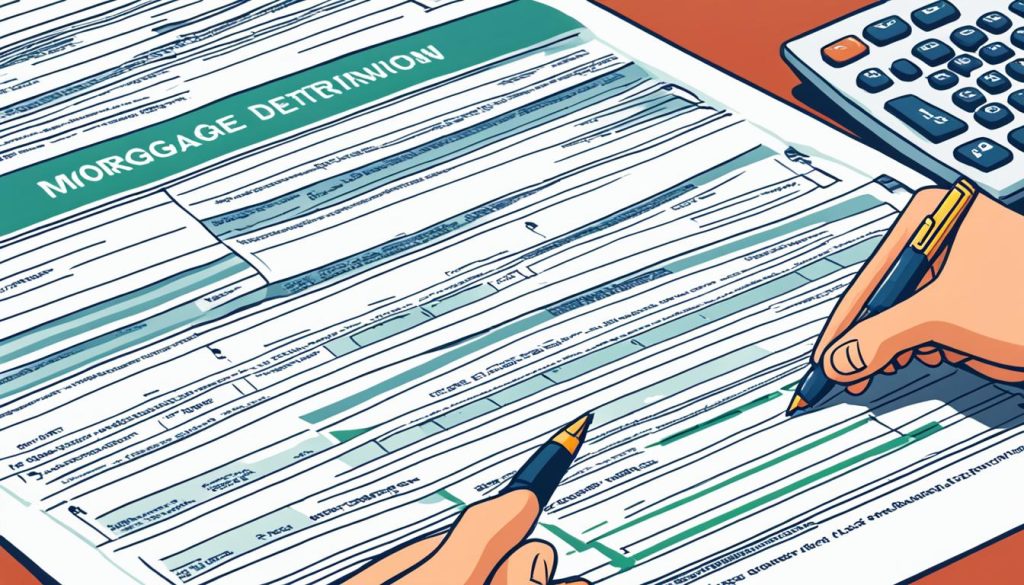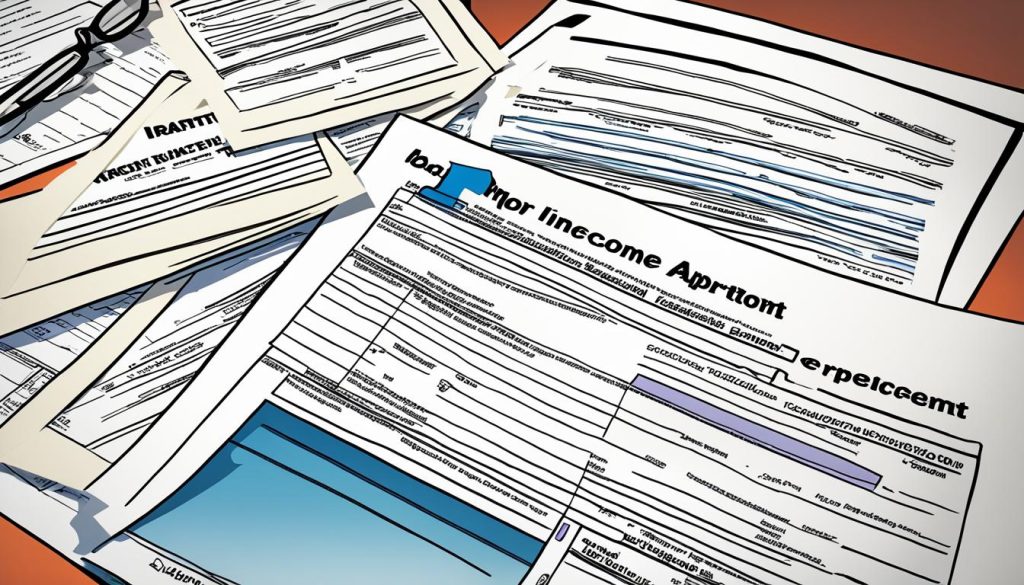Applying for a mortgage is a big step in your financial life. Lenders need many documents to check if you’re a good candidate. These documents look at your income, assets, debts, and credit history. Knowing what you need and having these documents ready can make applying for a mortgage easier and boost your chances of approval.
Key Takeaways
- The mortgage application process can take up to 60 days on average to complete1.
- Lenders typically require a minimum of 2 years of steady income1.
- Credit scores as low as 580 with a 3.5% down payment or 500 with a 10% down payment may be accepted for FHA loans1.
- Conventional loans typically require a minimum credit score of 6201.
- Lenders may request a letter of explanation for any credit issues1.
Income and Employment Verification
Your lender will ask for proof of your income and job status2. They want the last two years of W-2 forms, recent pay stubs, and tax returns if you work for yourself3. You might also need to show proof of other income like Social Security, disability, pensions, or child support3. The lender checks to make sure you have a steady income to pay back the mortgage.
Documents You’ll Need:
- Last two years of W-2 forms
- Recent pay stubs
- Tax returns (if self-employed)
- Proof of other income sources (Social Security, disability, pension, alimony, child support)
Showing your income and job is key to applying for a mortgage2. Lenders check your info using direct payroll links or third-party services2. How long this takes can vary, from a few minutes to weeks2.
By giving the right documents, you can make the income and job verification smoother. This can also boost your chances of getting your mortgage approved.
“Verification of income and employment for mortgages happens at different times: before approval, during processing, and before closing. This helps lower the risk of a loan buyback.”2
Assets and Liabilities
When you apply for a mortgage, your lender looks at your financial assets and liabilities. They want to see if you can pay back the loan. This check-up gives the lender a full view of your finances. It helps them decide if they should approve your mortgage application4.
You must show statements for your bank accounts, like checking, savings, and investment accounts. These show what money you have for a down payment, closing costs, and mortgage payments4. The lender also wants to see any rental income or money from selling assets you’ll use for buying a home4.
On the other side, the lender looks at your debts. This includes credit cards, student loans, auto loans, and mortgages on other properties you own. They use this to figure out how much you can borrow without getting overwhelmed5. Lenders like to see your debt-to-income ratio below 50%, but this can change from one lender to another5.
| Asset Type | Documentation Required |
|---|---|
| Checking and Savings Accounts | Bank statements |
| Investment Accounts | Investment account statements |
| Rental Income | Lease agreements, tax returns |
| Sale of Assets | Sale documents, bank statements |
The lender looks at your assets and liabilities to understand your financial health. This helps them decide how much to lend you and what terms to offer4. This careful check makes sure you get the loan you need and helps you become a homeowner smoothly.

documents required, application process, underwriting
When you apply for a mortgage, the underwriting phase is a key step. It’s where your financial details get a close look. You’ll need to provide more documents than just your income, assets, and debts. Lenders want to check if you’re a good fit for the loan6.
They might ask for your driver’s license, Social Security card, rental history, and info on other real estate you own. The underwriter checks your credit history, debt-to-income ratio, and the property’s value and condition. This helps decide if you qualify7.
Key Documentation for Underwriting
- Tax returns from the last two years
- Bank statements from the past 60 days
- Pay stubs
- Records of rent payments
- Copy of driver’s license and Social Security card
- Details on any other real estate owned
The underwriting process can take a few days to weeks. It depends on the lender’s workload and if they need more info6. Automated underwriting is quicker but might not work for everyone6. On average, it takes about 40 to 50 days to close a mortgage6.
Underwriters look at your credit score, job history, debt-to-income ratio, and assets to decide if you qualify7. They like to see your debt-to-income ratio under 43%7. You might get approved, denied, or get conditions set based on your finances7.
Knowing what underwriters look for helps you prepare for your mortgage application8.

Credit History and Scores
Your credit report and credit scores are key in getting a mortgage. Lenders look at your credit to see how you handle payments, debts, and how much credit you use9. If your credit report has negative marks like late payments or high debt, you might need to explain them.
Having a short credit history or low credit scores might limit your loan options. But, FHA loans can be easier to get for those with less credit history10. You usually need a credit score of 620 for a regular loan, and 500 for an FHA loan10.
When applying for a mortgage, your credit capacity is checked too. This looks at your income, debts, assets, and how much debt you have compared to your income11. Lenders look at the three C’s: credit, capacity, and collateral11.
| Credit Requirement | Conventional Loan | FHA Loan |
|---|---|---|
| Minimum Credit Score | 620 | 500 |
| Maximum Debt-to-Income Ratio | 50% | 45% (manual underwriting) |
Keeping your credit history and credit score in good shape is crucial for getting a mortgage. Knowing how credit affects your loan can help you fix any credit issues and improve your credit building efforts.
“A good credit score can open doors to better interest rates and more favorable loan terms.”
Conclusion
Gathering the right documents for a mortgage application checklist can feel like a big task. But, being proactive and organized can make it easier. This ensures a smooth loan process12.
The underwriting process checks your financial statements, job history, and other important documents. They do this to see if you can pay back the loan1213.
Having all the documents required ready in advance can boost your chances of getting the loan quickly1213. Lenders want to make sure you’re financially stable before giving you a mortgage. So, it’s key to provide all the needed documents.
The underwriting process can take a few weeks12. But, staying organized and quick to respond to requests can speed things up13. Working well with your lender and giving them what they need can make getting your loan approved smoother. This brings you closer to owning your dream home.
FAQ
What documents are required for a mortgage application?
When applying for a mortgage, you need to give your lender several documents. These documents prove your financial situation. They help the lender see if you can afford the loan and if you’re a good candidate.
What documents are needed to demonstrate income and employment?
Your lender will want to see proof of your income and job. You’ll need to provide the last two years of W-2 forms, recent pay stubs, and tax returns if you’re self-employed. They might also ask for proof of other income like Social Security or pensions.
What asset and liability documents are needed?
The lender will look at your assets and debts too. You’ll need to show statements for your bank accounts and any gifts or money from selling assets. They also want to see your debts, like credit cards or student loans.
What documentation is required for the application and underwriting process?
During the mortgage application, the lender will check your creditworthiness. You’ll need to provide more documents, like your driver’s license, Social Security card, and rental history. They’ll also want details on any other real estate you own.
How does my credit history and scores impact the mortgage process?
Your credit history and scores are very important for getting a mortgage. The lender will look at your credit to see how you’ve handled payments and debts. If there are any issues, like late payments, you might need to explain them.
Source Links
- Checklist of Documents You’ll Need for a Mortgage
- How Verification of Income & Employment for Mortgages Works
- How Verification of Employment (VOE) Works for Mortgage Lenders
- Underwriting Documents: A Complete Overview | Inscribe
- Mortgage Underwriting Process: A Complete Step-By-Step Guide
- What Is The Mortgage Underwriting Process? | Bankrate
- Mortgage Underwriting Process: What You Need to Know | CrossCountry Mortgage
- Understanding Underwriting and the Loan Approval Process – Directors Mortgage
- Understanding the Underwriting Process: The 5 Cs of Credit
- Your Guide to the Mortgage Underwriting Process | LowerMyBills
- Mortgage underwriting process—How long does it take? | U.S. Bank
- Step by Step Guide to Mortgage Approval | Guaranteed Rate Affinity
- What does the mortgage underwriting process look like? – Owning

